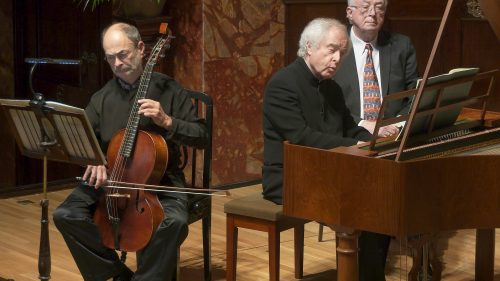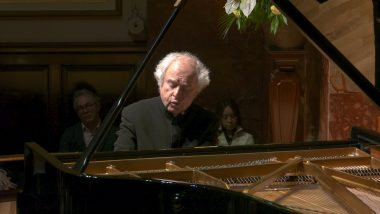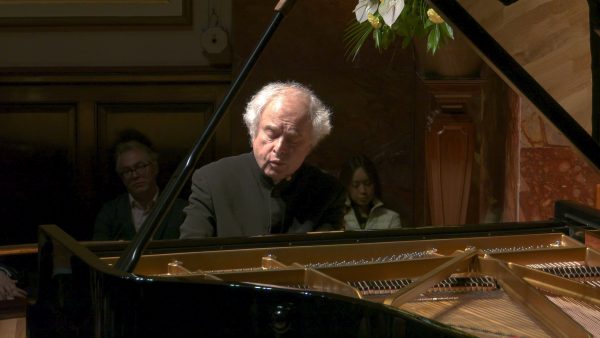 United Kingdom JS Bach, Haydn, Schubert: Sir András Schiff (piano and fortepiano), Christophe Coin (arpeggione). Wigmore Hall, London. 22.5.2023. (CSa)
United Kingdom JS Bach, Haydn, Schubert: Sir András Schiff (piano and fortepiano), Christophe Coin (arpeggione). Wigmore Hall, London. 22.5.2023. (CSa)

JS Bach – Prelude and Fugue in C from The Well-Tempered Clavier Book I BWV846
Haydn – Piano Sonata in C minor HXVI/20; Variations in F minor HXVII/6; Piano Sonata in E-flat major HXVI/52
Schubert – Arpeggione Sonata in A minor D.821
Sir András Schiff’s autumn recitals at London’s Wigmore Hall have followed a now familiar format. Programmes are not publicised in advance, and like rabbits pulled from a magician’s hat, are only revealed to the expectant audience by Schiff during the performance. Suspense is heightened by the presence of two instruments positioned on the stage: the Wigmore Hall’s 1970s Steinway concert grand (affectionately known as ‘The Old Lady’) and nestling behind it, a modern replica of a Conrad Graf fortepiano (c.1819) manufactured by Paul McNulty. Each piece played is preceded or followed by a pithy, gently sardonic and always illuminating explanation. This concert was no exception. After the hall’s customary announcement to switch off all electronic devices and ‘stifle’ any coughing (greeted by a titter of nervous laughter from those familiar with the maestro’s frequently expressed intolerance towards throat clearers and bronchitis sufferers), he appeared, briefly acknowledged the applause, and immediately took his seat at the Steinway. And what better way to begin than with Schiff’s favourite composer, Johann Sebastian Bach, and an ethereal rendition of his Prelude and Fugue in C major from The Well-Tempered Clavier Book I. Lucid, perfectly measured and immaculately phrased, this performance at once captured the grandeur and deceptive simplicity of Bach’s masterpiece. Hunched and concentrating intensely on the keyboard, Schiff achieved subtle modulations of tone by dextrous fingering alone, with the minimum of body movement and little if any recourse to the sustaining pedal.
Schiff is a great advocate and leading exponent of Joseph Haydn’s piano works, observing that Haydn’s admiration for England and respect for English audiences led to a deep and mutual appreciation. ‘It’s the opposite of Brexit’ quipped Schiff, comparing Haydn’s continuing popularity here with his neglect ‘on the Continent’ before introducing us to ‘possibly the first of Haydn’s great piano sonatas’: Sonata in C minor HXVI/20. Capturing the sonority and precision of an earlier instrument, his performance of this small masterpiece on the Steinway was a model of elegance and grace. The opening Moderato rang out with crystalline clarity, and the second movement Andante con moto brimmed with warmth and tenderness. Schiff also tapped into Haydn’s infectious humour in an impishly playful Finale, later observing that ‘No one would laugh in Germany!’
More Haydn followed. His Variations in F minor was written in 1793 in Vienna between his two stays in London, and according to legend, were intended to mark the death of Mozart. The musicologist Stephen Johnson has compared the shifting mood of this work to ‘clouds passing in front of the sun’. Schiff gave expression to this poetic image, alternating between melancholy and joyful exuberance, and concluding with a darkly gloomy coda.

Haydn’s Piano Sonata in E-flat major, his last and greatest, concluded the first half of the recital. Written in 1794 for Therese Jansen, an outstanding pianist living in London at the time, Schiff described it as ‘symphonic in character and full of humour’. These qualities were highlighted in a performance of Beethovenian drama fused with passages of unmistakably Haydnesque levity. After an infectiously rhythmic first movement Allegro, Schiff’s account of the Adagio was gently lyrical, summoning from the Steinway keyboard a sumptuous yet tender legato. The final Presto opened almost imperceptibly, but built up to a mischievously playful, frequently impassioned and technically dazzling conclusion.
Schiff promised ‘a real surprise’ after the interval. It came in the form of an historically informed account of Schubert’s Sonata for Arpeggione and Piano in A minor, and the appearance of French cellist Christophe Coin to play this rarely heard instrument, in collaboration with Schiff, on McNulty’s fortepiano. For the uninitiated, and I include myself amongst them, the arpeggione is a six-stringed bowed guitar invented in 1823, but whose popularity waned in the twentieth century. It is held between the legs and is unsupported by an underpin. Today, the sonata is mainly performed in transcriptions for cello or viola and piano, although, as Schiff informed us, there are versions which have substituted other instruments such as the double bass, harp or ‘even, God forbid, the flute’. The result was a fascinating but technically uneven performance. While it was engrossing to witness the recreation of a style and sound which were likely to have been familiar to Schubert, the power and dynamic richness we have come to expect from modern instruments was missing, and the dramatic and emotional impact on the listener was thereby much reduced. Additionally, in difficult passages, such as the multi-octave runs in the first movement Allegro and the delicate Allegretto finale, Coin occasionally struggled with intonations and was sometimes out of tune. Despite these anxious-making moments, the ‘sadness and smiles’ within Schubert’s masterpiece were wonderfully expressed, and the integrity of the music making shone through.
Chris Sallon

András Schiff’s mumbled, long-winded introductions left many of us in the dark. Some pieces were instantly recognisable, others, such as the Haydn Variations, not. He drew attention to himself rather than the music, an unpardonable flaw in his temperament.